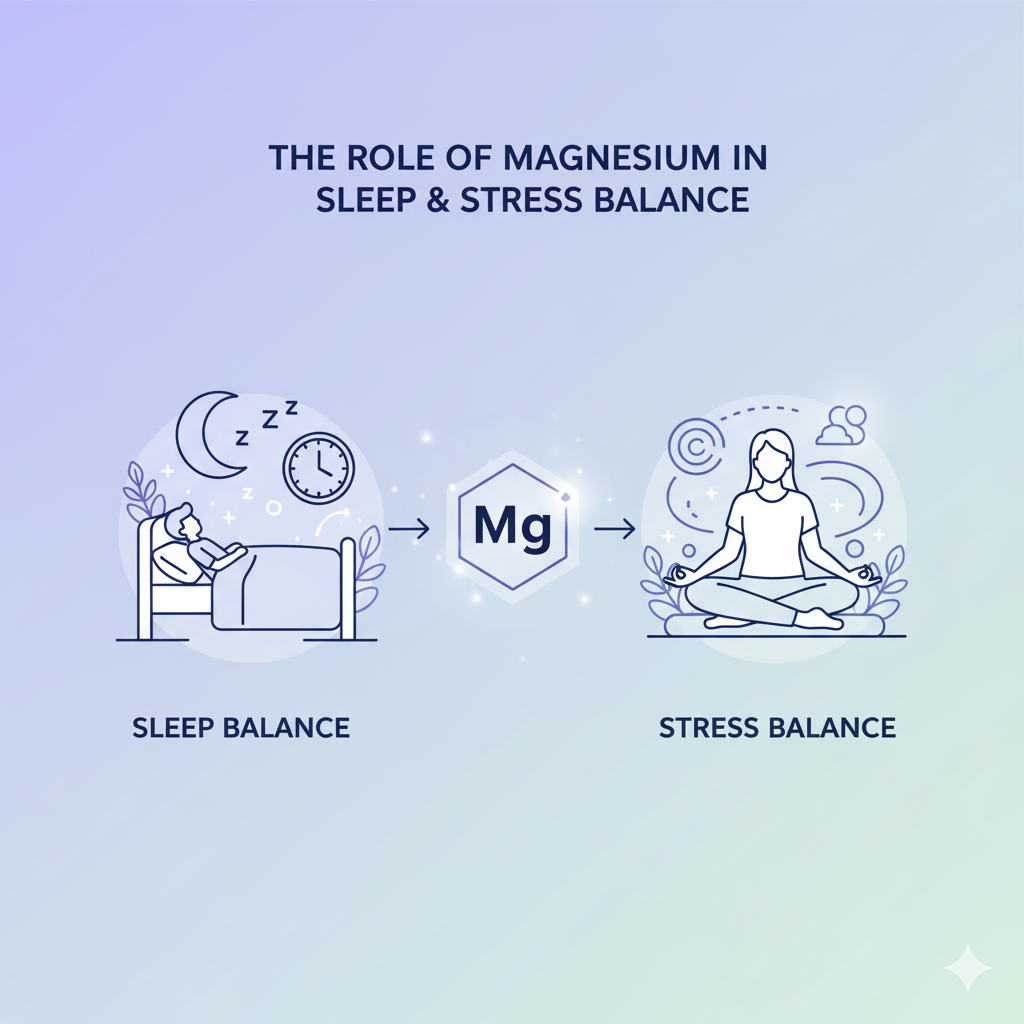Why Magnesium Matters More Than You Think

Magnesium is one of the most underrated minerals when it comes to health — yet it’s vital for over 300 biochemical reactions in the body.
From nerve relaxation and muscle recovery to hormone balance and blood pressure regulation, magnesium plays a quiet but powerful role in keeping us calm, focused, and well-rested.
Unfortunately, our diets low in whole grains, leafy greens, and nuts have made magnesium deficiency increasingly common, which can silently affect both sleep quality and stress resilience.
How Magnesium Supports Better Sleep

Magnesium influences several key pathways that regulate sleep:
1. Regulates Melatonin Production
Magnesium helps activate melatonin, the hormone that tells your body it’s time to sleep. Low levels may disrupt your circadian rhythm, leading to difficulty falling or staying asleep.
2. Promotes GABA Activity
GABA (gamma-aminobutyric acid) is a neurotransmitter that quiets your mind and prepares you for rest. Magnesium binds to GABA receptors, helping your nervous system wind down naturally.
3. Relaxes Muscles and Reduces Restlessness
Muscle tension or cramps at night can be linked to magnesium deficiency. Adequate intake helps muscles relax, making it easier to fall into deep, restorative sleep.
How Magnesium Helps Manage Stress
When you’re stressed, your body releases cortisol and adrenaline — hormones that prepare you for “fight or flight.”
Magnesium helps regulate this response in three ways:
-
Balances the Hypothalamic–Pituitary–Adrenal (HPA) Axis – your body’s central stress response system.
-
Reduces Cortisol Levels – studies show magnesium supplementation can lower stress hormone levels in people with chronic anxiety.
-
Supports Heart Rate and Blood Pressure Stability – keeping the body physiologically calm.
Research Insight:
A 2020 review in Nutrients found that magnesium deficiency amplifies the body’s stress response, while adequate intake improves mood and sleep quality.
Magnesium-Rich Foods for Relaxation
Including magnesium-rich foods in your diet is the most natural way to support sleep and stress balance. Listing a few of them.
| Food | Magnesium (mg per 100g) | Bonus Benefit |
|---|---|---|
| Pumpkin seeds | 550 mg | Boost serotonin & omega-3s |
| Spinach | 86 mg | Anti-inflammatory |
| Avocado fruit | 48 mg | Healthy fat |
| Tofu | 50 mg | Plant protein source |
| Banana | 30 mg | Natural sweetness for better sleep |
| Dark chocolate (70%+) | 228 mg | Improves mood & antioxidants |
| Amaranth seeds | 270 mg | helps support muscle relaxation. |
Signs You Might Be Low in Magnesium
-
Muscle cramps or twitching
-
Poor sleep quality
-
Anxiety or irritability
-
Fatigue or low mood
-
Sugar cravings
Key Takeaway

Magnesium is your body’s natural “calm mineral.”
It supports restful sleep, balanced mood, muscle relaxation, and better stress control — all essential for long-term wellness. Start by adding magnesium-rich foods daily — a handful of seeds, leafy greens, or a warm bowl of oats can truly make a difference.


